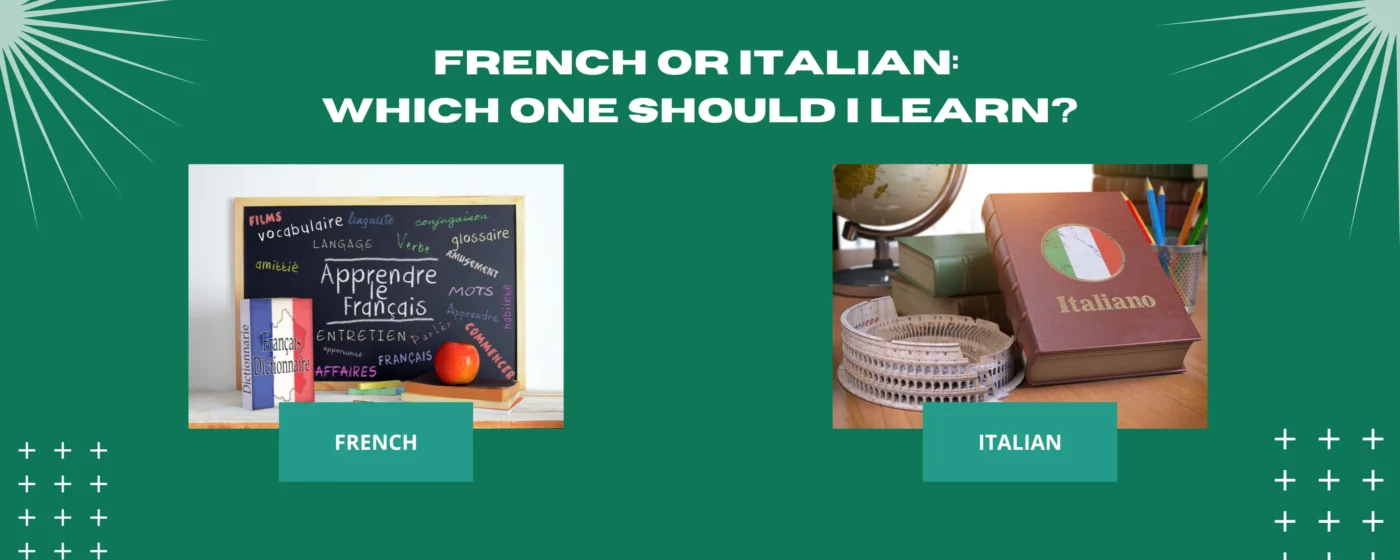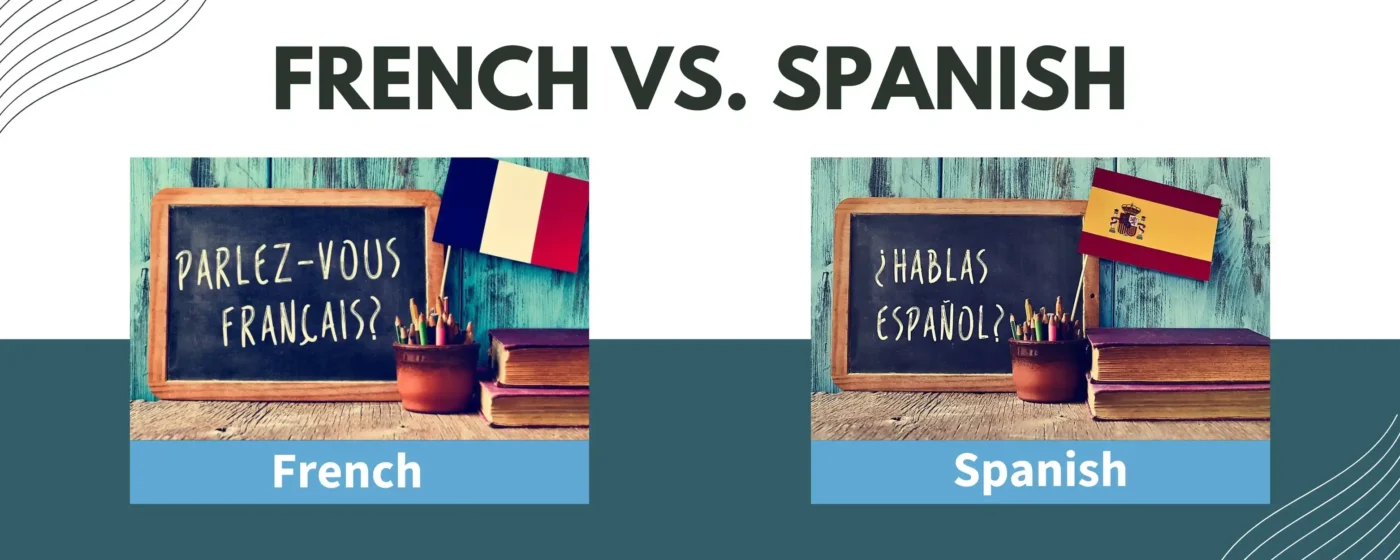Ever dreamed of sipping coffee in a Parisian café or enjoying an Italian opera in Rome? Caught in a dilemma of which of these dreams to fulfil? Well, choosing between French and Italian is a similar (and not to mention) but very common dilemma for language learners. Both are Romance languages, rich in history and have words with beautiful pronunciations. The French language is spoken globally by over 300 million, and holds significant weight in international diplomacy, business, and culture. Italian, while having fewer speakers (around 67 million globally), is the language of art, fashion, and culinary excellence, deeply rooted in European heritage. In this article, we’ll talk about both these languages, compare and contrast their utility as well as difficulty and career benefits. Andiamo!
Key Takeaways
- The French language is spoken by over 320 million people worldwide, which plays a major role in diplomacy, business, and international organisations.
- Italian, spoken by around 67 million speakers, is celebrated for its rich culture, art, fashion, and cuisine, mainly in Europe.
- Italian pronunciation is easier for English speakers as it is largely phonetic, while French has silent letters.
- French and Italian are valuable for careers in international relations, education, and the luxury industries, whereas Italian is important in fashion and tourism.
- You can choose between French and Italian, which depends on your goals, interests, and which cultural or professional path excites you.
Popularity and Global Reach
On one hand, French language has a vast global reach with over 320 million speakers worldwide. It’s not just spoken in France, but also quite commonly used across Africa, as well as in Canada and parts of Europe like Belgium and Switzerland. This widespread presence makes French an important language in international diplomacy and business. French is also an official language of the United Nations, the European Union, NATO, and many other global organizations, facilitating communication in international relations, humanitarian efforts, and various trade sectors.
Conversely, Italian language has a significantly smaller number of speakers, around 67 million globally. It’s primarily spoken within Europe, particularly in Italy, Switzerland, San Marino, and Vatican City, with minority status in parts of Croatia and Slovenia. While Italian communities exist worldwide due to historical migration, its diplomatic influence is largely concentrated in Europe. Italy is a founding member of many international organizations, including the UN and EU, but Italian is less commonly used as a working language in these international organizations compared to French.
If you’re unsure which learning mode suits you best, this detailed comparison of online vs offline language schools will help you decide wisely.
Ease of Learning: Which Language is Simpler?
French and Italian, both of Latin origin, share many similarities. For English speakers, this means familiar sentence structures (subject-verb-object) and several similar-sounding words. Both these languages use grammatical gender (masculine/feminine) for nouns and adjectives, and verb conjugations majorly follow similar patterns.
However, pronunciation is where these 2 languages differ the most. Italian is largely phonetic – words are pronounced as they’re written, with clear vowel sounds and predictable stress. This makes Italian pronunciation easier for English speakers. French, on the other hand, has silent letters, nasal vowels, and a more fluid, less consistently stressed rhythm, which can be trickier to master.
When it comes to grammar, both languages have similar levels of complexity. Italian can sometimes seem a little more forgiving since it often allows you to drop subject pronouns (like in “Parlo italiano” instead of “Io parlo italiano”, meaning “I speak Italian”). French, however, is more rigid and requires subject pronouns almost everywhere.
In terms of learning resources, both languages are very popular, so you’ll find a plethora of options online. Apps like Duolingo, Babbel, Memrise are very popular. Also, podcasts like Coffee Break French/Italian, News in Slow French/Italian are also helpful. Online tutors are also available for both languages on platforms like Italki. Whether you choose French or Italian, finding materials to help you learn will be the least of your problems!
Career and Business Opportunities
When considering job prospects in 2025, both French and Italian offer unique advantages.
French typically holds a stronger global position in certain sectors like diplomacy and international relations, being an official language of the UN, EU, NATO. This makes French highly valuable and sought-after for careers in international organizations, government, and foreign services. Also, French is strong in international trade and business, especially with companies operating in Francophone Africa, Canada, and within the EU. Beyond these, the tourism and hospitality industry also benefits greatly from French speakers, much like fields of education, healthcare, luxury goods and aviation, where French brands are prominent.
Italian, while having a smaller global footprint, is incredibly valuable in its specific niche areas. It is a language of fashion and luxury design, essential for people working with iconic Italian brands like Gucci, Prada, and Versace. The culinary arts and food and beverage industry also heavily favor Italian speakers, given Italy’s rich gastronomic heritage. Moreover, Italy has an immense number of UNESCO World Heritage sites, rendering Italian invaluable. While less widespread, Italian is also seen in tourism within Italy and certain academic or research roles focused on Italian culture.
Cultural Appeal: Food, Art, and Travel
France and Italy are both cultural giants, with a long history of influencing the world in cinema, literature, and art. French cinema is known for its artistic and thought-provoking films. French literature has given the world some of the most renowned philosophers, novelists, and playwrights, whose works are studied all over the world. Furthermore, in art, France is famous for movements like Impressionism and iconic museums like the Louvre.
Italy, on the other hand, has an unparalleled legacy in art, producing masters like Leonardo da Vinci and Michelangelo. Italian cinema, known for Neorealism and directors like Fellini, has left an indelible mark on film history. Italian literature is also rich with epic poems and modern novels.
When it comes to food and lifestyle, both offer different yet significant experiences. French cuisine is celebrated for its sophistication, fine dining, pastries, and wines. The French lifestyle often emphasizes elegance, leisure, and enjoying the finer things in life. Italian food, on the other hand, is beloved worldwide for its pasta, pizza, gelatos, and regional specialties, emphasizing fresh ingredients and family gatherings. The Italian lifestyle is often associated with passion, warmth, and the concept of “dolce vita” – the sweet life.
Learning either foreign language will significantly enhance your travel experiences. Speaking French in France will permit you to connect deeply with locals, navigate cities with ease, and truly appreciate the nuances of French culture, from ordering at a Parisian café to understanding plays. Similarly, speaking Italian in Italy will open up a world of authentic experiences, from bargaining at local markets to understanding the passion behind a chef’s dish, and feeling more at home exploring ancient ruins or charming villages.
Which One Should You Choose?
Choosing between these two great foreign languages ultimately comes down to your personal goals and ambitions.
If your passion lies in international relations, global business, or exploring diverse cultures across continents, French might be your ideal choice. Its widespread use in diplomacy and international organizations will open doors to many professional opportunities.
However, if you dream of a career in fashion, culinary arts, design, or deeply immersing yourself in European art and history, then Italian could be more rewarding. It offers a unique connection to a rich cultural heritage.
For travel, both languages can equally enhance your experience positively. French unlocks the nuances of France, parts of Canada, and Africa. Whereas, Italian provides an authentic journey through Italy’s art, food, and lifestyle.
Ultimately, both French and Italian are incredibly rewarding languages to learn, each offering uniquely rich and profound cultural experiences.
The final decision on which language is right for you will depend entirely on your specific aims and future goals. Both these foreign languages are incredibly rewarding to learn, offering rich and unique cultural experiences. Finally deciding which language is for you, depends on your aims and future goals!
Did You Know?
- Learning French can make learning other Romance languages (like Spanish, Portuguese, and Italian!) significantly easier due to shared vocabulary and grammar structures. It’s often called a “gateway” language.
- French is the only language, besides English, that is taught in every country in the world.
- Italian is often considered one of the most melodic and musical languages in the world, which is why it’s the official language of opera!
- Italian is considered one of the easiest languages for English speakers to learn, especially in terms of pronunciation!
Conclusion
French offers global relevance in diplomacy and international business, while Italian excels in fashion, culinary arts, and design. Both these languages share grammatical similarities but differ in pronunciation, with Italian generally being more phonetic. Resources for learning both languages are abundantly available. Ultimately, your decision to choose a language among the 2 should align with your career aspirations and cultural interests, whether it’s international relations or artistic immersion. Ultimately, choose the language that ignites your passion. So, will you say ‘Bonjour’ or ‘Ciao’ in 2025?
If you’re unsure which language suits your goals better, this comparison of French vs German breaks down key differences to help you decide which one to start learning.
Frequently Asked Questions
1. Beyond “ciao”, what’s a common, friendly Italian greeting that’s less frequently taught to beginners?
Ans: While “ciao” is universal, “Buongiorno!” (good morning/day) or “Buonasera!” (good evening) are some other common greetings. People use them broadly as a polite “hello”.
2. Is it true that French has a “silent letter problem”? Can it be beneficial to beginners learning the language?
Ans: While French is famous for its silent letters (especially at the end of words), this isn’t just a quirky hurdle. French verb endings, though spelled differently for “je”, “tu”, and “il/elle”, are often pronounced the same. This means you don’t need to learn separate pronunciations; just identify the subject from context or the pronoun. It’s a “silent” shortcut in learning French.





